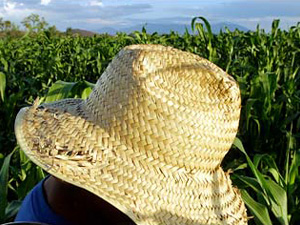
|  |  |  Editorials | Issues Editorials | Issues  
Mexico Farm Subsidies are Going Astray
 Tracy Wilkinson - Los Angeles Times Tracy Wilkinson - Los Angeles Times
go to original
March 07, 2010


| | Its failure has driven tens of thousands of subsistence farmers to ruin and encouraged the planting of illegal crops, such as marijuana and opium poppy, on vast tracts of farmland, experts and officials say. |  |
The fund set up to help Mexican agriculture compete with subsidized U.S. farmers under the free trade accord was meant to aid the poorest. Instead, drug kingpins' kin and a Cabinet minister benefit.

Mexico City - When Mexico and the United States were entering a landmark free trade agreement 16 years ago, one thing was clear: Mexican farmers would initially find it difficult to compete with heavily subsidized U.S. agricultural products.

The solution: Mexico created a special fund to dole out cash to the poorest and smallest farmers.

Somewhere along the way, something went wrong. Today, the fund - far from helping the neediest - is providing large financial subsidies to the families of notorious drug traffickers and several senior government officials, including the agriculture minister.

Revelations of how and to whom the money is being distributed have led to a spasm of demands from legislators to change the system. But, as with most examples of colossal corruption in Mexico, it is unlikely that the program will be overhauled.

Its failure has driven tens of thousands of subsistence farmers to ruin and encouraged the planting of illegal crops, such as marijuana and opium poppy, on vast tracts of farmland, experts and officials say.

"It would be a mistake to eliminate the program altogether, but the lists [of beneficiaries] have to be purged," said Mauricio Merino, an investigator with an economics think tank in Mexico City and an expert on the subject. "Once you stop giving money to the poor, it opens the window for everyone to start collecting."

Under the program, known as Procampo, an estimated $1.3 billion was given last year to 2.7 million farmers. The allotment is about $74 to $100 per 2.5 acres. But, according to several academic studies, as much as 80% of the money went to just 20% of the registered farmers.

Among the most eyebrow-raising recipients were three siblings of billionaire drug lord Joaquin "El Chapo" Guzman, head of the powerful Sinaloa cartel, and the brother of Guzman's onetime partner, Arturo Beltran Leyva.

Guzman has been a fugitive since escaping from a prison in 2001, more or less the year his family began receiving thousands of dollars in farm subsidies to grow, ostensibly, corn, sorghum and sesame.

Beltran Leyva was also a fugitive for many years until he was killed in a shootout with Mexican marines late last year. Younger brother Carlos, despite his own brushes with the law, has been receiving regular subsidies for a decade or more.

Many of the details on the recipients were first published in the newspaper El Universal, which obtained some of the information through the Mexican equivalent of the Freedom of Information Act.

The Times has learned that another top associate of Guzman, Victor Emilio Cazares, received more than $100,000 from Procampo to subsidize his raising of cattle. Like many suspected big-time traffickers, he maintains legitimate crops and livestock alongside his alleged illegal business.

Much of the corruption crept into the Procampo program early on, Merino said. In a misguided, easily abused effort to promote transparency, the money was assigned by property, instead of to individuals. The aim was to prevent people with political connections from moving to the front of the line. In fact, the process meant that big property-holders could apply for each ranch, farm and plot of land they owned. Only last year was a cap placed on how much an individual could receive.

In the meantime, others who reaped bountiful benefits were Agriculture Minister Francisco Javier Mayorga Castaneda, along with his father and four siblings, as well as a number of politicians and large transnational food-production companies. Mayorga says he started receiving the subsidies before he was named a Cabinet minister, so he has no reason to return or refuse them.

He also says the families of narco-traffickers cannot be denied subsidies unless the registered plot of land is shown to be sown with illicit crops.

Mexico in the last 20 years has morphed from a country that fed itself to an importer of food, as thousands of farmers have abandoned the land and sought jobs in cities. The failure of the Procampo program also has helped drive many smaller farmers into the network of drug traffickers.

Ricardo Garcia Villalobos, head of a federal court that handles agrarian issues, said 30% of Mexican farmland is planted with such illegal crops as marijuana and poppies instead of, or sometimes alongside, traditional corn and beans.

"It is necessary," Garcia said, "that the government now see and treat this problem as a matter of national security."

wilkinson(at)latimes.com |

 |
|  |



